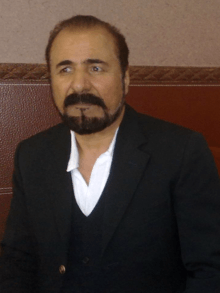Şivan Perwer
| Şivan Perwer | |
|---|---|
 Şivan Perwer performing at a concert in Sweden, 2005 | |
| Background information | |
| Born |
December 23, 1955 Siverek, Turkey |
| Genres | Kurdish Folk Music |
| Occupation(s) | Poet, writer, singer, performer |
| Instruments | Bağlama/Saz |
| Years active | 1974-present |
| Website |
www |
Şivan Perwer (Born İsmail Aygün) (pron: Shivân Perwer) (born December 23, 1955 in Siverek (Kurdish: Sêwreg), Turkey) is a Kurdish poet, writer, musical teacher, singer, and performer on the Bağlama (Also known as the Saz). Şivan fled Turkey in 1976 due to the political tones of his music and lived for 37 years in continuous exile until his return to Diyarbakir on November 16, 2013.[1][2] He still lives in exile to this day. Perwer also holds several honorary doctorates in music.
Birth and Early Life
Perwer was born as İsmail Aygün in Siverek, Turkey on the 23rd December 1955. However this cannot be proven because of the fact that the majority of the inhabitants of the Turkish part of Kurdistan were uneducated and so did not know about the registry offices. It is most likely that Perwer was registered as a Turkish citizen on this day, Which can make theoretically him either a few weeks younger.[3]
As a child Perwer was exposed to Kurdish music at a very young age, which made him who he is today.
Biography
For 25 years, Perwer's songs were banned in Iraq, Syria, and Turkey because they are sung in Kurdish and often cite the oppression against the Kurdish people in the Middle East, most notably Turkey[4] Cassettes of his music were passed along from hand to hand, despite the risk of imprisonment or death. Şivan became famous during the period of Kurdish protests against Iraqi rule at Ankara University in 1972. His homemade recordings were smuggled over the border, while thousands of people came to see him perform live. Fearing for his life and the welfare of his family and after calls from Turkish authorities demanding his arrest, he fled Turkey and settled in Germany in 1976. There, Şivan recorded his first official album of traditional Kurdish songs. In 1991, Şivan performed at the "Simple Truth" Live aid concert, alongside Peter Gabriel, Sting, Paul Simon, Tom Jones, Gipsy Kings as well as other international artists. The proceeds from the concert went to the aid of Şivan Perwer refugees in the Iraqi Kurdistan fleeing the Gulf War and was considered as one of the most important humanitarian efforts for the region. In 2004, Şivan took an initiative for the improvement of culture in society by establishing the Sivan Perwer International Cultural Foundation in Frankfurt, Germany. On Tuesday, March 21, 2006, Şivan Perwer was featured on PRI's The World in their Global Hits segment.[5] Thus far, Şivan Perwer has over thirty albums, music videos and documentaries. He has written several books and several other publications as well. Şivan has a career expanding over forty years and has received many honorary Doctorates and International World music prizes. He has composed music and sung many songs using the poetry of the late Kurdish poet, Cigerxwîn. Cigerxwîn was well known for his poetry about the Kurdish struggle and also about Kurdish culture and history. At one time, Cigerxwîn referred to Şivan as "the Voice of his poetry". Kurdish songs (or dengbej) are considered by some to be one of the key elements in preserving the Kurdish culture and history.[1] Şivan Perwer was very close to Hessin Abdulrahman Swari, who is one of the main factor in Perwers fame. As Hessin Abdelrahman Swari was a man of great integrity and held closed ties between kurds from all parts of Kurdistan.
Şivan Perwer is seen as the most famous Kurdish singer/songwriter of all time.
Discography
- Govenda Azadîxwazan (1974)
- Hevalê Bargiran im (1974)
- Herne Pêş (1975)
- Ey Ferat (1976)
- Kî ne Em (1977)
- Le Dilbere (1978)
- Hay Dil (1979)
- Gelê Min Rabe (1982)
- Agirî (1983)
- Bilbilo / Ferzê (1984)
- Dotmam (1985)
- Naze(1986)
- Helebçe (1987)
- Xewna Min / Qasimlo (1988)
- Zembîlfiroş (1989)
- Ya Sitar (1995)
- Hêviya Te (1999)
- Roj û Heyv (2000)
- Sare (2004)
- Cane Cane (2009)
Lyrics to Şivan Perwer music and songs can be found at the Kurdish Lyric Archive at Bêjebêje.
References
- 1 2 "Med-Music on the move: Music of immigrants in Europe". Retrieved 2009-01-07.
- ↑ "Kurdish musician returns to Turkey after 38 years of exile to 'sing for peace'". Retrieved 2013-11-16.
- ↑ http://www.milliyet.com.tr/-kimsin-sen-sivan-perwer-/asu-maro/pazar/yazardetay/24.11.2013/1796860/default.htm
- ↑ MusicMoz - Bands and Artists: P: Perwer, Sivan: Biographies
- ↑ "Sivan Perwer - PRI's The World". Retrieved 2009-01-07.